
The Jewish Year
The Hebrew name for year is SHANAH. The lunar year consists of approximately 354 and ½ days. The solar year has 365 and ¼ days. So there is a difference of about 11 days between the lunar year and the solar year. But because the seasons are dictated by the sun, it was calculated that it is necessary to add an intercalary month, or leap month, 7 times in 19 years, in order for the Jewish Holy Days to be observed at their proper season.
Twelve lunar months comprise an ordinary or common year. A year with 13 months, a leap year, occurs seven times in this 19 years cycle, in the 3rd, 6th, 8th, 11th, 14th, 17th, and 19th year. The leap month is inserted in the calendar immediately after the month of Adar and is called ADAR SHENI - THE SECOND ADAR. The year in which ADAR SHENI occurs is called SHANATH ABOR - LEAP YEAR. To determine the status of any Jewish year, whether it be a leap year or not, the year is divided by 19. The answer will indicate its status in the cycle of years. For example: if the year is 5781 (2020/2021), when divided by 19, the result is 304 with remainder 5 (304 X 19 = 5776+5=5781). This means that we have completed 304 cycles of 19 years; that we are now into our 305th cycle; that we are in the 5th year of that cycle and that 5781 is not a leap year. Normally there are 52 weeks in a 12 months year. But in a leap year, in which there are 13 months, there are 56 weeks and that it is why the annual reading of the Torah is divided into 54 portions plus two special readings because during the year there are two Shabbats in which the cyclical regular reading of the Torah is interrupted by a special reading: the Passover and Sukkoth. Both are eight days Holy Days, therefore, they always contain a Shabbat in which the reading is for that specific Holy Day. There may be other special readings during the year such as for Rosh haShanah and Yom Kippur depending if they fall on Shabbat or not, therefore to complete the reading of the Torah in one calendar year some weeks have two Torah portions combined into one reading.
The Biblical beginning of Months and the New Year are reckoned as two different events in the modern Jewish calendar. Exodus 12:2 tells us that “This month shall be to you the beginning of months (the month of Aviv or Nisan); it shall be the first month of the year to you." It is determined by the conjunction of the moon with the sun that forms the Vernal Equinox in the spring time. In Hebrew this particular period is called TEKUFOTH NISAN - THE CYCLE or PERIOD OF NISAN.
But the Talmud - Mas. Rosh Hashanah 2a says:
THERE ARE FOUR NEW YEARS. ON THE FIRST OF NISAN IS NEW YEAR FOR KINGS AND FOR FESTIVALS. ON THE FIRST OF ELUL IS NEW YEAR FOR THE TITHE OF CATTLE. R. ELEAZAR AND R. SIMEON, HOWEVER, PLACE THIS ON THE FIRST OF TISHRI. ON THE FIRST OF TISHRI IS NEW YEAR FOR YEARS, FOR RELEASE AND JUBILEE YEARS, FOR PLANTATION AND FOR TITHE OF VEGETABLES. ON THE FIRST OF SHEVAT IS NEW YEAR FOR TREES, ACCORDING TO THE RULING OF BETH SHAMMAI; BETH HILLEL, HOWEVER, PLACE IT ON THE FIFTEENTH OF THAT MONTH.
The "Beginning of Months," Nisan, should not be confused with Rosh haShanah, the New Year, which occurs in the fall on the first day of the month of Tishrei. The beginning of months is used to reckon all feasts, fasts, and holidays, the New Year is associated with the creation of the world and the year of release, or the Sabbatical Year. The other two “New Years” are associated with the tithe of cattle and with the trees, Tu B’Shevat.
But, there are two interesting futures of the Jewish calendar, the Sabbatical Year, or the Week of Years, and the Jubilee Year, or the Week of Sabbatical Years.
The Sabbatical Year is ordained in the Bible in Leviticus 25:1-7: “And the Lord spoke to Moses in Mount Sinai, saying, Speak to the people of Israel, and say to them, When you come into the land which I give you, then shall the land keep a Shabbat to the Lord. Six years you shall sow your field, and six years you shall prune your vineyard, and gather in its fruit; but in the seventh year shall be a Shabbat of rest to the land, a Shabbat for the Lord; you shall not sow your field, nor prune your vineyard. That which grows of its own accord of your harvest you shall not reap, nor gather the grapes of your vine undressed; for it is a year of rest to the land. And the Shabbat produce of the land shall be food for you; for you, and for your servant, and for your maid, and for your hired servant, and for the stranger who sojourns with you, and for your cattle, and for the beast that are in your land, shall all its produce be food.” It is also known as SHANATH HA-SH’MITAH - THE YEAR OF RELEASE, or as a Shabbat rest for Yehovah. During the Sabbatical Year it was ordained that the soil was not to be plowed, and the land permitted to lie fallow. Because this "release" took place every seven years it was called The Week of Years - SHANATH HASHEVAH.
Shemittah, the Sabbatical year, teaches us that in every thing we should depend on God, it teaches that God is the one who provides and controls the law of nature. Leaving the fields untended and unguarded for a year, demonstrates that this world is but a corridor leading to the ultimate world, the eternal life with God. The true life comes when man stops striving for material gain in favor of dedication to spiritual growth by obeying God’s commandments. But man cannot abstain totally from the world he lives in, that is why Shemittah is only once in seven years, just as is the Shabbat, every seventh day. This infuses holiness and purpose into our work years and our workdays. The similarity between Shemittah and the Shabbat is that both bear testimony of God’s creation and His blessings upon us, because the observing of the Shemittah would have brought blessings to Israel just as Shabbat does.
The Jubilee Year or the Week of Sabbatical Years - Seven times seven years, 49 years, constitute this period. The fiftieth year was to be celebrated as the year of Jubilee. It was announced on the day of YOM KIPPUR - ATONEMENT DAY and was proclaimed with the teruah – a succession of nine blasts - sounding of the Shofar. The obligations upon the Jewish people during the Jubilee Year were similar to those of the Sabbatical Year, except all workers were to be set free, all debts canceled, and property was to be restored to the original owners. Leviticus 25: 8-13: “And you shall count seven Shabbats of years to you, seven times seven years; and the space of the seven Shabbats of years shall be to you forty and nine years. Then shall you let resound the Shofar an alarm (teruah) on the tenth day of the seventh month, in the Day of Atonement shall you sound the Shofar throughout all your land. And you shall hallow the fiftieth year, and proclaim liberty throughout all the land to all the inhabitants of it; it shall be a jubilee (yobel) to you; and you shall return every man to his possession, and you shall return every man to his family. A jubilee shall that fiftieth year be to you; you shall not sow, nor reap that which grows of itself in it, nor gather the grapes in it of your vine undressed. For it is the jubilee; it shall be holy to you; you shall eat the produce of it out of the field. In the year of this jubilee you shall return every man to his possession.”
The Year of Jubilee attests to the existence of a God of mercy and grace. The fact that the Jewish people did not keep this beautiful commandment did not alter the fact that God did not change. He is still a God of mercy and grace.
Leviticus 25: 17-23: “You shall not therefore defraud one another; but you shall fear your God; for I am Yehovah your God. Therefore you shall do my statutes, and keep my judgments, and do them; and you shall dwell in the land in safety. And the land shall yield her fruit, and you shall eat your fill, and dwell in it in safety. And if you shall say, What shall we eat the seventh year? Behold, we shall not sow, nor gather in our produce; Then I will command my blessing upon you in the sixth year, and it shall bring forth fruit for three years. The land shall not be sold forever; for the land is Mine; for you are strangers and sojourners with Me.”
Our God is an awesome God full of mercy and grace who will keep extending His mercy to every one of us in spite of our shortcomings. Through the keeping of the Biblical calendar we are reminded of the blessings He bestowed upon us. Such as the counting of the Omer for forty-nine days — that is seven Shabbats — and on the fiftieth day is Shavuot, as a jubilee, in which God gave us the Torah and the Ruach haKodesh, the Holy Spirit - His teachings and the power to receive and understand His teachings, because knowledge of His word is not enough, but must be accompanied by the doing, the application of what was learned.
May the Ruach haKodesh indwell every one of us so we can all enter into His good works that He prepared for us beforehand.
|


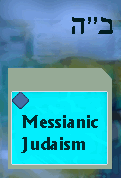 Is Messianic Judaism Biblical Judaism?
Is Messianic Judaism Biblical Judaism? 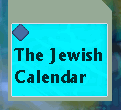 What is the Jewish Calendar?
What is the Jewish Calendar?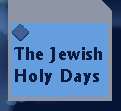 The Jewish Holy Days are the seven God's Holy Days.
The Jewish Holy Days are the seven God's Holy Days.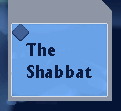 The Shabbat is the seventh day which God sanctified and set apart for worship.
The Shabbat is the seventh day which God sanctified and set apart for worship.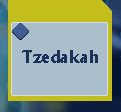 Tzedakah, the righteous giving.
Tzedakah, the righteous giving.